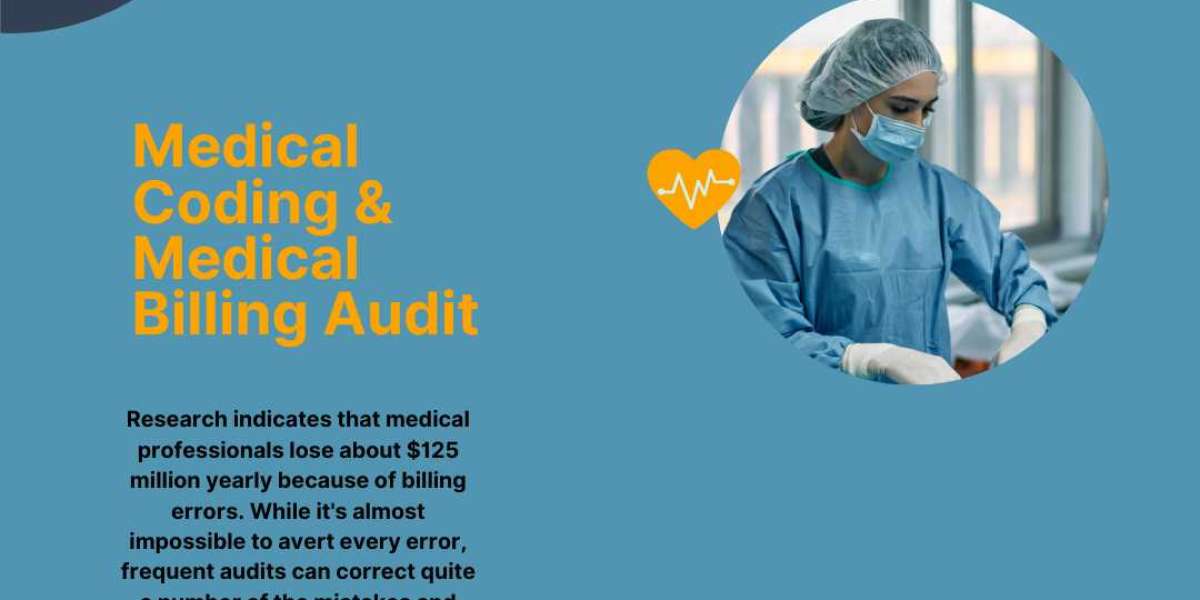Research indicates that medical professionals lose about $125 million yearly because of billing errors. While it's almost impossible to avert every error, frequent audits can correct quite a number of the mistakes and help recover some of the lost revenue. That's where the advanced medical coding and billing companies with expertise come in, as most healthcare providers don't have these capabilities in-house.
Accurate coding is important in that it ensures healthcare providers are reimbursed correctly for services and helps prevent denials of claims. However, inaccuracies in coding lead to major billing errors and loss of revenue. This is how medical auditing comes into play. Medical auditing, in other words, is a check from every possible angle on the medical billing and coding procedure to spot and correct the errors.
Close audits of companies providing advanced medical coding and billing result in error-free documentation and insurance claims, thereby augmenting operational efficacy and improving financial health. A two-pronged approach to ensure accurate coding and intense auditing helps healthcare providers recover lost revenue and maintain financial stability.
How Does Medical Coding Work?
Coding is a difficult procedure, but health experts walk you through it step by step. This reduces the likelihood of mistakes, resulting in successful claims. Here are the stages for medical coding:
Checking the Information of Patient
Medical coders begin by reviewing the patient information reported in the papers. It comprises demographic information, such as name, age, ethnicity, gender, and socioeconomic status. Medical coders assign code names to patients after analyzing their personal information.
Patient Records Documentation Medical Coding
Once the patient is assigned a code name, he undergoes a series of medical tests, such as a FMRI, PET scan, or ultrasound. Healthcare providers analyze the patient's medical testing and identify the condition. Medical coders convert all legible information, including medical tests and diagnoses, into medical codes that are then utilized for medical record-keeping and billing.
Verification of Medical codes
As we saw in the preceding two processes, individuals' personal information is safeguarded by converting readable data into unreadable codes. Medical coders utilize standard codes to keep track of subjects. However, due to the complexity of the medical coding procedure, mistakes are common.
Coders periodically evaluate the modified alphanumeric characters to eliminate mistakes. Once a patient's therapy is complete, the codes are extensively examined again to discover any errors. Medical coders verify that the codes in a report are comprehensive, correct, and follow healthcare sector laws.
Entering Code
It is the final stage in which medical coders submit claims by inserting codes into a database. The coded data is provided to insurance companies, and coders track the payment process. If the data contains mistakes, medical coders correct them before re-entering the codes.
Understanding Medical Billing Audit Services
Before we get into the top medical billing auditing services offered by an advanced medical coding and billing company, we need to define what a medical billing audit is. Every service provided by the healthcare practitioner is documented. The paperwork includes all treatment-related information, such as medications and invoices. The billing process includes several processes, including coding, submitting claims, and generating analysis reports.
Errors may develop as the bill progresses through several phases. Medical billing auditing is necessary to guarantee that claims filed by health providers do not contain billing mistakes. Several organizations provide medical billing auditing services, but the one that guarantees 100% correctness, believes in fair transactions, and focuses on mistake ratification is the
Why Is a Medical Billing Audit Important?
1. Prevention of Revenue Loss
One of the primary reasons why medical audit billing is recommended is that it can avert a $125 million loss in income. Some experts argue that instead of performing an audit, we should prevent billing errors; nonetheless, billing errors can arise for a variety of reasons.
For example, incorrect coding might result in billing errors or noncompliance with healthcare legislation. We should take steps to avoid these problems, but if billing errors go unnoticed, a medical billing audit can help identify and correct them.
2. Compliance with Regulations
Another reason to support medical billing audits is compliance with regulations, since the healthcare business is governed by several laws. Medical billing audits minimize mistakes to prevent violations of laws and regulations.
Factors of Medical Billing Audit
1. Pre-Medical Billing Audits.
The billing process begins with pre-medical billing audits, in which an advance medical coding and billing company ensures that claims are error-free before they are filed. Pre-medical billing involves the following steps:
- Coding Inspection: Ensures codes correspond to services offered.
- Document Inspection: Checks the completeness of a subject's documentation.
- Inspection of Billing procedures: This phase ensures billing procedures comply with laws and regulations.
2. Post-Medical Billing Audits
Post-medical billing audits are undertaken after healthcare providers' claims are submitted to ensure that all billing methods comply with healthcare rules and legislation. In addition, the skilled staff ensures that documentation and coding are accurate. Here are the next stages in post-medical billing audits:
Coding and documentation inspection begins with a team of professionals ensuring the accuracy of coding and documentation by matching them with the services delivered.
Checking Financial Compliance: After ensuring the correctness of coding and paperwork, professionals determine if the services are in accordance with applicable laws and regulations.
3. Internal audits.
Internal audits are the third most important component that is often overlooked by other organizations, but an advanced medical coding and billing company is well-known for them. During the auditing process, a team of professionals examines how healthcare providers manage medical bills, the risk factors for errors, and how to correct them.
- Inspection of Billing Process: The process starts with reviewing how healthcare providers handle invoices and identifying problems.
- Error Detection and Resolution: If errors are identified, the team notifies healthcare providers and works to resolve the issues.
4. Payer Contract Audits
Another auditing service provided by an advanced medical coding and billing company is known as payer contract audits in which our team of experts carefully reviews the payer contracts. Experts make sure the terms and conditions align with the healthcare regulations and laws. Additionally, an advance medical coding and billing company provides you with a report that contains information about the payments as per the contract.
5. HIPAA Compliance Audits.
HIPAA (Health Insurance Portability and Accountability Act) refers to the rules and regulations enacted by the government in 1996. The goal of this legislation is to guarantee that a patient's health information is not released without his permission. An advanced medical coding and billing company guarantees that healthcare providers follow HIPAA laws by verifying the accuracy of a patient's health information handling procedure.
6. Abuse Prevention Audits
Last but not least is the abuse prevention audit procedure, which involves our team of professionals looking for suspicious activity connected to bill patterns. The goal of abuse prevention audits is to identify suspect billing trends and implement steps to avoid financial fraud.
Conclusion
Medical billing audits and proper coding are critical for the healthcare industry's financial stability and operational efficiency. Billing errors can result in considerable revenue losses, but frequent audits can correct these mistakes and ensure compliance with healthcare standards. Accurate medical coding is critical for ensuring fair transactions, reducing claim denials, avoiding financial loss, and enhancing patient satisfaction. Healthcare providers may improve overall patient care by employing comprehensive auditing and coding standards that assure transparent, fraud-free invoicing.







